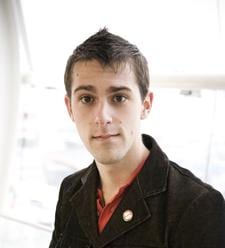
Credit: Christine McAvoy photo
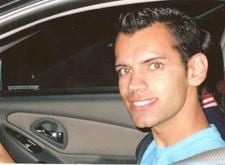
Credit: courtesy of Ash Harpal
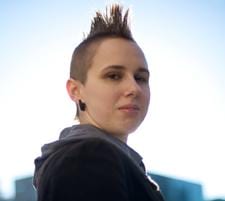
Credit: courtesy of Sylvia Machat
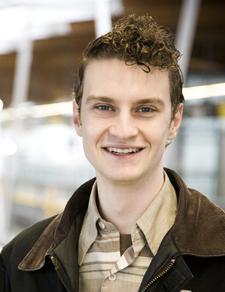
Credit: Christine McAvoy photo
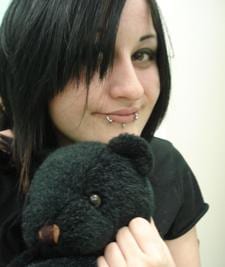
Credit: courtesy of Chantell Gregg
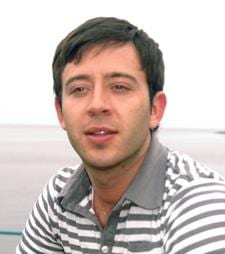
Credit: courtesy of Jody Jollimore
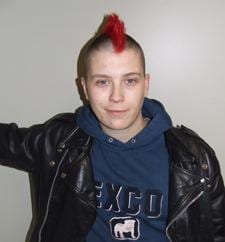
Credit: Robin Perelle photo
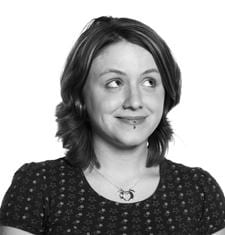
Credit: David Ellingsen photo
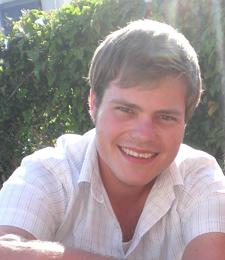
Credit: courtesy of John Kuipers
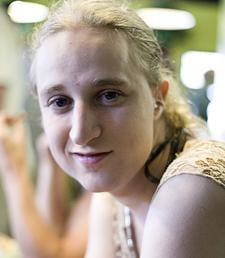
Credit: courtesy of Emily Sors
Lydia Luk
When Lydia Luk agreed to do her first PrideSpeak at age 19, she thought she was going to talk to a class of 30 students. Instead, she found herself facing a group of 300.
Not yet completely out, she panicked and used a fake name.
“Halfway through the workshop we started using my real name because I wouldn’t answer to the fake one,” she remembers, “and I got a standing ovation.”
Now 25 years old and running the PrideSpeak program at The Centre, Luk credits those early outreach sessions with giving her the confidence to step fully from the closet.
She also credits her predecessor at The Centre, Gab Youth Services’ Romi Chandra, for paving the way.
“I wouldn’t be the PrideSpeak and outreach coordinator at The Centre if it weren’t for Romi Chandra,” she says.
Today, Luk’s tireless efforts to create gay-friendly school environments are spurred on by the thank-you letters she regularly receives from students who say “having us at their school helped them feel less alone, and that other students have become more accepting of who they are.”
PrideSpeaks are so important because they create opportunities for discussion that wouldn’t necessarily occur otherwise, Luk says. If Jordan Smith’s attacker, for example, had had a chance to openly explore his discomfort things may have turned out differently, she suggests.
“I think everybody could benefit from more dialogue, more opportunities to just learn from each other,” she says. “Education, dialogue, people talking and sharing will hopefully lead to a better understanding of each other, of ourselves, who we are as people.”
Luk believes today’s queer youth will grow up safer but says the biggest challenge facing her generation is the idea that homophobia is a thing of the past.
“Media representation of queerness further enforces stereotypes,” she says, citing one example of ongoing homophobia. “And even though we don’t judge heterosexuals on the way they’re portrayed on Days of Our Lives, queer people have to face the stigmas that media hands us.”
Asked her hopes for the future of queer, Luk says she wants “to see a community that is strong, respected, celebrated, and connected with each other and the rest of the communities of Vancouver and Lower Mainland.”
“We already have the beautiful souls who are more than capable of making it happen.”
Ryan Clayton
Ryan Clayton, 21, grew up in a small town where being gay was something he was supposed to keep to himself.
“Homophobia and bullying were big obstacles in my school and town,” he says.
No surprise, then, that since arriving in Vancouver a few years ago, Clayton has thrown himself into improving circumstances for queer youth.
He has been presenting PrideSpeak workshops to youth just a few years younger than himself for the last two years, and will soon bring a series of similar workshops to his hometown area of Salmon Arm to foster gay-friendlier schools in the Interior.
He says he likes “giving kids a chance to talk about the things that often aren’t talked about in schools.”
The workshops give students a chance to discuss whatever is on their minds which, in the end, leads to inclusivity and open-mindedness, he believes.
He says he won’t stop going into schools until homophobic language is a thing of the past in classrooms and hallways. He still hears an alarming amount of people saying “that’s so gay” about things they merely dislike.
Clayton counts Harvey Milk, Jim Deva and the people at The Centre among his heroes. While he thinks we have progressed since Milk’s time, he says “we need to remember that we still have a long way to go.”
“We may have won some rights on a piece of paper in Ottawa,” he says, “but until no one is being bullied anymore, queers still need to take up the fight.”
Ash Harpal
Ash Harpal’s hero has become one of his best friends.
“Amar provided me with an opportunity to get involved and give back to the gay community, which brings me a great deal of satisfaction and helps me to accept my own sexuality,” Harpal says, referring to Amar Sanga, co-founder of Sher Vancouver.
Sher was founded last year as a group for gay, lesbian, bisexual, trans and intersex Punjabi and South Asian people and their friends, families, and allies. Though originally begun specifically as a gay Sikh group, Sher has since expanded to include Muslim, Hindu, Jewish and Christian members too.
At 23, Harpal is now the group’s acting moderator and Pride coordinator.
“We have to learn how to deal with the segment of the population that does not approve of homosexuality for cultural or religious reasons,” he says.
“It hit us that there are some people who are homophobic out there in our community that do not like what we are doing.”
Sher’s online presence is fast becoming a powerful resource for hundreds of South Asians. Harpal refers to the group as family.
The space Sher is creating —at the intersection of the South Asian and queer communities —is the perfect place to advance diversity politics, he believes.
Change happens slowly, he acknowledges, and every movement has its challenges but “if you believe strongly in something you must fight for it and never give up.”
Ever committed to advancing dialogue, Harpal sees “a bright future for the South Asian queer community.”
“South Asian queers are coming out of the closet every day and we are making our mark in society,” he says. “We are speaking out and demanding our rights.”
Sylvia Machat
Sylvia Machat laughingly credits her sex drive as the fuel behind her activism.
Well-known for her daring performance art contributions to Diva’s Den and other burlesque shows, the 24-year-old also finds time to volunteer for the Vancouver Pride Society, Out on Screen and the Vancouver Dyke March. Right now she’s “in the middle of curating an art show and figuring out how to organize kinky queer events beyond the bar scene.”
Machat attributes her passion for community building to “belly fire —that feeling you get when you just know you have to do something.”
“I just have a really clear understanding of right and wrong and it bugs me when people do things that are unfair or hypocritical.”
Asked for an example, Machat tries to bite her tongue for a moment then blurts out that she’s outraged by the queer community’s lack of support for “anyone beyond the gender binary.”
“As someone who identifies as genderqueer or androgynous and is not transitioning, I find it really challenging to make myself and my peers visible and acknowledged in a community that still bases itself on gender binaries —man, woman or on the way to one or the other,” she says.
Machat comes across as critical but not angry; committed, simply, to challenging isolation and alienation.
“One of the major challenges of my generation is figuring out how to stay connected to our past. We need to remember what we’ve come from,” she says.
Just because some rights have been won for some gays and lesbians doesn’t mean all queers are free, she adds.
She often finds herself battling one of the trickiest sentiments of her generation —”the idea that the rights are won and the job is done.”
Still, she envisions a queer future in which diversity reigns and everyone is more open-minded.
She jokes that her activism “is all about creating her dating pool” but it’s clear that there’s more to her motivation than simply getting laid (albeit an important goal in itself).
Machat is a mobilizer and an organizer who recognizes the value of creating queer spaces. She’s fostering strength, fun and diversity one playparty at a time.
Brandon Marshall
“There’s a huge difference between a rich gay man and a queer street kid,” Brandon Marshall muses, “but there are similarities too and they far outweigh the differences.”
The 25-year-old sits on the board of directors at YouthCO AIDS Society and acts as a facilitator for workshops with queer street-involved youth, prisoners, Aboriginal youth, and HIV-positive youth.
In his spare time, he’s working toward his PhD at UBC on homelessness, methamphetamine use, and HIV risk among street-involved queer youth.
More outstanding than his CV is Marshall’s heart.
With institutional backing for his research, he feels it’s his duty to give back to the community. He considers himself both fortunate and privileged and recognizes that his activism stems from wanting to support marginalized youth.
He is also concerned about the implications of his generation’s attempts to redefine itself. “Queer youth do not consider themselves part of the traditional gay or lesbian communities, a fact that has huge implications for health and harm reduction programs,” says Marshall, who has been lobbying for the word queer to be included in health research and literature.
He thinks Vancouver’s queer community “needs to fight for our right to equitable access to health care that is non-judgmental, youth-friendly and free from sexual and gender discrimination.”
When asked who his heroes are, turns his thoughts back to the community. “Youth living with HIV are my heroes and are the reason for the work that I do,” he says.
The community needs to stick together, he says. “We need to stand up and fight together.”
Chantell Gregg
When Chantell Gregg’s school board failed her last fall, she turned to the queer community.
The Grade 11 student at Abbostford Collegiate High School was incensed when the board cancelled Social Justice 12, a class 90 of her peers at nearby WJ Mouat high school had signed up to take. So she called for a Pride parade in Abbotsford on her Facebook page.
“I heard gay, faggot and lesbo in my school so many times. I was sick of the discrimination in the schools and on the streets of Abbotsford and I wanted to do something.”
Gregg’s Facebook site quickly attracted a lot of attention, much of it negative. People said Abbotsford’s not the place for a Pride parade, she says. She disagrees. “It’s the perfect place for it,” she maintains.
“If it doesn’t stir up crap —piss in somebody’s cornflakes —if somebody doesn’t oppose it nothing is going to get done,” she says.
Gregg’s proposed Pride parade eventually morphed into the Dec 6 Social Justice Rally that drew hundreds of queers and allies who proudly marched rainbow flags through Abbotsford and defied a last-minute attempt by the city to re-route.
“I don’t like seeing people hurt by discrimination, it bothers me,” she says simply when asked what she thinks of the rally she co-organized.
As she sees it, working toward social justice is a process. “A large change doesn’t happen overnight. Little by little I can see changes around me, especially in my peers and people with whom I associate everyday.”
She dismisses her own activism as though it were the most natural thing in the world that a 16-year-old could pull off such an extraordinary feat as a sizeable demonstration in a city that’s never seen a Pride march before.
In fact, Gregg seems to think of herself as a typical teen who just happens to be standing up for social justice.
“I try to let it be known to the mis/non-informed people out there that the queer community, including straight allies, are not a negative influence,” she says.
Gregg, who says she’s been part of the queer community her whole life —”even before I knew it” —understands herself to be part of a much larger movement.
“There’s no room for people to be left behind or thought of as marginal,” she says.
Jody Jollimore
Jody Jollimore, 27, is great at getting people to laugh, a handy quality for someone who regularly hangs out in bars asking gay men about their sexual preferences and activities.
Jollimore works with Mancount, a sexual health survey being conducted right now by Vancouver Coastal Health with funding from the Public Health Agency of Canada.
“We need real statistics so we can lobby for real change,” he says.
Right now gay men’s health is disproportionately underfunded, he explains. The community needs research and statistics to prove that more funding and attention to gay men’s health is needed and warranted.
“With more research, statistics and facts to present to legislators, we are able to better advocate for policy changes and funding increases.”
In the past, Jollimore notes, it was relatively easy to reach the vast majority of gay men since gay culture was traditionally built, and still congregated, around bathhouses and bars. “All you had to do was slap some posters in stalls and you knew the information would reach the community.”
But that’s changing now, he says. “Since this next generation of gay men aren’t confined to Davie St and many of them prefer Main St’s haunts, the greatest challenge for this generation of young guys is communication.”
Still, he’s neither dismayed by these cultural shifts nor by the queer community’s embrace of the internet. In fact, Jollimore considers technology a friend of the queer community.
“Men often have an easier time hooking up by using online networking sites,” he points out.
One of his pet projects that he “can’t seem to let go of” is the popular online cartoon Vick Vancouver, about a young gay guy who moves to the city in search of community. The serialized animated drama gets nearly 1,000 hits every week, he says.
Jollimore speculates that a good portion of their numbers are “men from rural communities and guys who are just curious.”
He hopes the show will inspire his peers and show them that there is a larger gay community they can turn to.
Davyd Eide-Hvaal
For Davyd Eide-Hvaal activism begins with a mustache.
“You’d be surprised how many drag kings don’t know how to make realistic-looking facial hair,” laughs the boisterous transman.
Eide-Hvaal, 25, puts a lot of energy into mentoring both young drag kings and trans men.
“The fact that there is an IDKE [International Drag King Extravaganza] means that our youth are being courageous,” he says, adding he beams with pride every time a new performer takes the stage.
Eide-Hvaal’s personal brand of activism is all about spending as much one-on-one time with younger trans guys as he can. “Making time for everyone because even the most inane questions can be crucially important.”
Solidifying the bonds between trans folks is his first priority, he continues. “Trans people have felt alienated and alone for far too long.”
These days, he says, “the ties in the trans community are strengthening but we need to keep at it and learn from each other and support each other.”
He credits Ryan Coke with fostering online community for trans men through his forum-based website called transdude.com.
His second biggest priority is fostering a spirit of activism in the queer community at large.
“Vancouver’s queer community is really coming together and strengthening bonds and ties,” he says, pointing to the recent rallies in Abbotsford and against Fred Phelps’ threatened Laramie Project protest —both of which Eide-Hvaal attended.
After gay marriage rights were won the community needed to take a couple of low-key years, he suggests, but these demonstrations prove that “we have it in us to come together and continue the battle.”
Eide-Hvaal is convinced that things are getting better. “I no longer feel alone when I go into gay spaces,” he says. “I know my brothers and sisters are with me.”
Monika Whitney
When Monika Whitney’s ex-husband argued that “gay people ruin families,” she knew something had to change.
After the marriage to her high school sweetheart crumbled, Whitney became convinced that if she “had been exposed to queer culture early on, and was taught that it was normal, that I would have come out a lot earlier and would have saved myself and others worlds of trouble.”
Now the widely respected volunteer coordinator for the Vancouver Pride Society, the 25-year-old has developed the indispensable qualities of being able to organize and mobilize members of the queer community.
A self-identified lesbian, Whitney is currently dating a man, an experience that only furthers her drive toward queer activism and her keen eye for discrimination. “Part of me feels guilty holding my partner’s hand on the street because no one bats an eye, there is no fear there, no risk,” she admits.
In addition to the Pride Society, Whitney has also given her time over the past few years to a handful of other queer organizations “with a mission to push for exposure and visibility.” She wants everyone to have the freedom to choose whose hand they wish to hold.
“I sort of fear that there is this huge divide that exists between the queer community and the not-so-queer community,” Whitney says. “Our greatest challenge and our greatest benefit is that we’re so different from each other and we need to work together to achieve common goals.”
Conflict is good for a community, she muses thoughtfully. “It’s okay for us to disagree with each other,” especially when we’re furthering a greater vision.
Whitney would like to see her generation take huge leaps forward in terms diversity and visibility. “We need to move beyond tolerance into acceptance,” she says.
John Kuipers
What started out as a work-study position at the University of the Fraser Valley’s Pride Youth Society has blossomed into a full-time passion for John Kuipers.
A student at the university and now president of its Pride society, Kuipers was instrumental in organizing Abbotsford’s Social Justice Rally (along with Chantell Gregg) on Dec 6. He sees it as his “duty to enhance an awareness of diversity on campus and within our community.”
Studying social work seems a natural fit for Kuipers, who also facilitates the weekly drop-in for queer youth in Abbotsford. These meetings are “extremely rewarding” for the 23-year-old who points out that living in Abbotsford presents a unique set of challenges, the most important of which is a lack of understanding.
“One of the major challenges for queer youth in Abbotsford is being recognized and respected as authentic individuals,” he says.
A lot of people in Abbotsford believe “that queer youth are just missing something, or they are confused, or they are acting out,” he points out.
Creating a place for queer youth to gather in Abbotsford is crucial, he says, because “for many of us, it’s our only chance to socialize with other queer youth.”
Although he didn’t set out to become an activist, Kuipers now muses that “a human service professional is an agent for social change.”
“I just hope that in reaching my goals, I’m able to help others reach theirs,” he says.
Emily Sors
Emily Sors chokes up when recounting her struggle to help her family come to terms with her real self.
The 25-year-old has had to dedicate a lot of her time and resources to hormone therapy and surgery.
She credits the strength of the queer community with her success thus far. “So many people have taken this path before me and it reminds me that I can do this. I have healthy role models of all genders.”
One might be tempted think that a youth so well-versed in the particular needs and rights of the trans community would gravitate toward trans-related activism, but Sors is all about defying expectations.
When she noticed that Vancouver’s Pride parade didn’t have a proper recycling system in place, she approached the Pride Society about its obligation to environmentalism. Next thing she knew, Sors found herself on the Pride Society’s board, where she is now spearheading a push toward implementing a proper recycling program.
“I love the Pride Parade,” she says, “but we can’t be throwing our waste into garbage cans.”
As yet, she doesn’t know exactly how to set up a better system but says the other board members support her efforts and she’s optimistic that “we’ll get there.”
As she sees it, one of the main obstacles to the sexual liberation movement is the binary gender paradigm.
“For genderqueer, trans and intersex youth, there is a strong movement away from labels because they don’t represent who we are,” she says.
Sors has moments of feeling dismayed by the inequalities still faced by the queer community. “We’re still a distinct and marginalized people,” she says.
But she’s also vocal about the goodness she sees in Vancouver’s queer community in terms of championing diversity. “We’re skilled at working together. Whether we’re sticking up for sex workers, trans people and even marginalized groups that have nothing to do with queerness.”
Her ideal future of queer would expand to encompass many more facets and communities than we have seen to date. “Not only does it advance our rights but it advances everyone’s rights when we work together for justice,” she says.
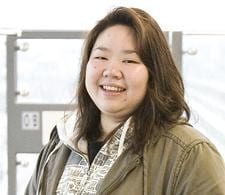
 Why you can trust Xtra
Why you can trust Xtra


